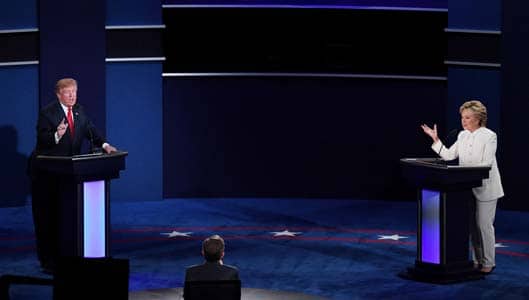Are Twitter bots shaping perception of 2016 US presidential election?
How do you think the US presidential debates between Donald Trump and Hillary Clinton went?
When it comes to deciding who the winner of each debate was, we can rely on our own perceptions, or listen to the various polling data that’s continually rolled out.
However, our own perceptions may be wrong, or biased. And polling data can be skewed, or just plain wrong.
The winner of a presidential debate is arguably the candidate that most people believe won the debate, since it’s ultimately just a case of winning votes. As such, to determine the winner of a debate, we find ourselves turning to social media platforms like Twitter to see what others are saying.
This means the public perception of the debates, and subsequently the presidential election overall, can be shaped by the opinions we see posted by others.
However, this perception may very well be skewed too. Only this time, skewed by hard-working robots. A recent study has shown that a substantial number of tweets posted on Twitter the days after the first presidential debate supporting either one of the two candidates weren’t actually penned by a human at all, rather by bots – bots programmed to post supportive tweets for a specific candidate multiple times each day, in an attempt to create the perception that the candidate did – or is doing – well. Such tweets include popular hashtags associated with each candidate, including #MakeAmericaGreatAgain and #LoveTrumpsHate.
Sponsored Content. Continued below...
A recent study has shown that Trump is certainly winning with the supportive bot tweets. 32.7% of 1.8 million analysed tweets supporting him were posted by a bot. Clinton had her fair share of automated tweets too, though not quite as many, with 22.3% of 613,000 analysed tweets supporting her that were posted by a bot.
And this was only after the first debate. The number of automated tweets posted in support of both candidates has most likely sky-rocketed since the final debate.
The whole thing demonstrates the importance public perception on social media has become, and how presidential campaigns have clearly embraced it, albeit not officially. It can provide momentum, motivation and even conformity, knowing that the social media tide is turning in your favour.
As it turns out, the battle of winning over social media is largely just a game of numbers. The automated authors of these tweets may not understand the meaning of their work, but the tweets themselves are certainly not meaningless. Together they can help shape perception. The only question is, how much of an effect can that have on the result in November?
Continued below...
Thanks for reading, we hope this article helped, but before you leave us for greener pastures, please help us out.
We're hoping to be totally ad-free by 2025 - after all, no one likes online adverts, and all they do is get in the way and slow everything down. But of course we still have fees and costs to pay, so please, please consider becoming a Facebook supporter! It costs only 0.99p (~$1.30) a month (you can stop at any time) and ensures we can still keep posting Cybersecurity themed content to help keep our communities safe and scam-free. You can subscribe here
Remember, we're active on social media - so follow us on Facebook, Bluesky, Instagram and X
